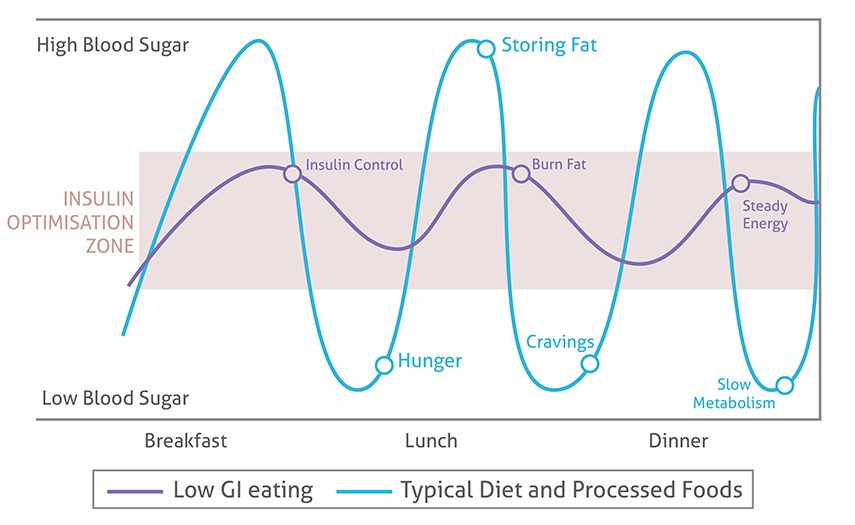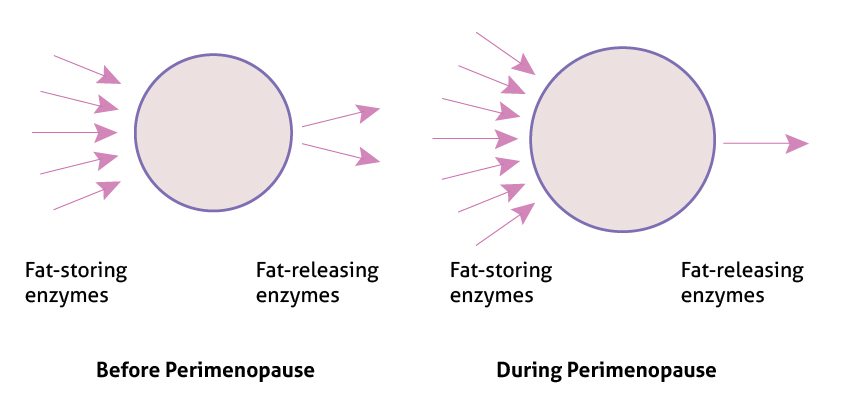The Real Cause of Menopausal Weight Gain

Changes in metabolism cause weight gain as you age and contributes to menopausal weight gain.
In why calorie restricted diets make you fat, I explained the power of the hormone insulin to shunt surplus energy (glucose from food) into fat cells.
And if you eat high sugar foods with a high glycemic index (GI) it causes a spike in insulin levels. And as a result, a rapid storing of the surplus as fat.
The link between weight gain as you age & menopausal weight gain
The truth is that as we age our bodies change. It starts with a slow and gradual reduction in sex hormones (estrogen in women and testosterone in men) as early as 30 years. This leads to a reduced basal metabolic rate (BMR). And using the analogy of our body as a car motor, the BMR is the rate the motor idles at.
So when you are younger you are more ‘high rev’. As you age you slow down and ‘idle’ slower. The higher you rev, the more energy you burn just sitting still. As you age you end up burning less energy.
In addition, you also begin to lose muscle mass. Women lose it at a rapid rate in the first few years post-menopause. And your muscle mass is the engine that burns the energy (fuel) you eat (calories in food). So if you eat the same amount of food but burn less, the surplus energy goes into fat storage.

Epigenetics & menopausal weight gain
This energy metabolism is happening in every cell in your body and is controlled by your genes. Indeed, your genes dictate what enzymes your cells produce and whether you make fat burning enzymes or fat storing enzymes.
Further, new research in the field of epigenetics has discovered that your genes can be switched on and off by your lifestyle. Things such as what you eat (specific nutrients), what you are exposed to and even what activities you do, including what you think about!
Yes, that’s right. You can literally turn certain genes on or off by your behaviour.
This is very well described in the book The Fat Switch by Richard J. Johnson M.D.
So, as we age we see:
- Decreased sex hormones
- Decreased basal metabolic rate
- Decreased muscle mass
- Reduced energy expenditure
- More fat storing enzymes
- Less fat releasing enzymes
This all leads to an energy surplus. This surplus is stored as fat in fat cells. And voila! Menopausal weight gain.
What’s more, if you get fatter you have even less energy. It’s harder to exercise, so you do less, which means your muscles shrink more. And your BMR declines more so it becomes a vicious cycle. The fat switch has been turned on and the weight gain you might observe in your middle years begins.
So now you have surplus blood glucose, hungry fat cells, more fat storing enzymes, less fat releasing enzymes, less muscle to burn it, and reduced metabolism. BOOM! The fat switch is turned on! You have the perfect storm for fat building and piling on the weight.
But if you are experiencing menopausal weight gain and your estrogen levels are declining, your fat cells are trying to expand anyway. (Read “menopausal weight gain” which explains why this is so.)

(The arrows in this diagram illustrate the enzymes that store and release fat. They do not reflect the exact number of enzymes; they are to help you visualise how female fat cells function. Menopause Without Weight Gain by Debra Waterhouse.)
Conclusion
What can you do about menopausal weight gain?
Avoid energy spikes and especially avoid insulin spikes caused by high GI meals.
Here are some tips on how to do this:
- Avoid calorie restricting diets. Aim for healthy eating instead.
- Eat smaller meals more regularly – five or six smaller meals through the day is best. One or two of these could be a satisfying protein shake, which provides satiety and extra nutrients in a convenient way. This helps reduce hunger and cravings and you are less likely to over-eat.
- Minimise intake of sugars (sweets, desserts etc), high GI foods, processed packaged foods (they often have hidden sugars), and alcohol, especially beer.
- Exercise regularly, but not fanatically.
- Drink plenty of water.









